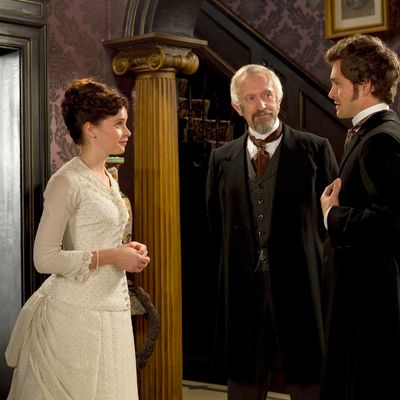
DonÔÇÖt get too excited. Hysteria may be a film about the guy who invented the vibrator, but itÔÇÖs probably the most demure movie youÔÇÖll ever see about the creation of a sex toy. Tanya WexlerÔÇÖs film goes through the moves of irreverence ÔÇö thereÔÇÖs lots of wink-wink innuendo and irony to spare ÔÇö but it could just as well be about the guy who invented the cheese grater. The handsome production values will bring to mind Merchant-Ivory, but the real inspiration here might be Walt Disney.
Okay, thatÔÇÖs maybe taking it a bit too far. ThereÔÇÖs at least the promise of social heft in WexlerÔÇÖs story line. Our hero is germ-obsessed and forward-looking Dr. Mortimer Granville (Hugh Dancy), who, finding that the 1880 medical establishment frowns on his progressive and scientific ideas, gets a job with womenÔÇÖs medicine specialist Dr. Robert Dalrymple (Jonathan Pryce). DalrympleÔÇÖs got his hands full manually, er, relieving uterine pressure on women diagnosed with hysteria (a catch-all malady to deal with such symptoms as ÔÇ£weeping, nymphomania, frigidity, melancholia, and anxietyÔÇØ). Unfortunately, all that rubbing causes Dr. Granville to come down with a case of hand cramps, so really, he was a martyr for carpal-tunnel research as well.
To the rescue comes his odd flatmate, Edmond St. John-Smythe (Rupert Everett, practically a talisman for this kind of period piece), a wealthy playboy/wannabe-inventor who keeps trying to perfect some kind of automated feather duster thingamabob. Granville uses the device to massage his hand; he then realizes it could be used to massage other things. In the meantime, he falls for DalrympleÔÇÖs fiery social worker daughter Charlotte (Maggie Gyllenhaal, compelling as always but handicapped this time with an unfortunate British accent) ÔÇö a complication, because heÔÇÖs supposed to be marrying the other, younger, more retiring daughter, Emily (Felicity Jones).
The kinds of bizarre diagnoses women were subject to in the not-so-distant past (and indeed even in the present) are no laughing matter, so to some extent Wexler & Co. are brave to tackle this in a comedic manner. The story line ties GranvilleÔÇÖs medical-psychological-sexual breakthrough to CharlotteÔÇÖs fight for social justice for poor and abused women, and that too is a bold connection. But Hysteria is too busy trying to be a romantic comedy to spend too much time in the area of social drama. And it doesnÔÇÖt quite pull the romantic-comedy thing off well, either: Gyllenhaal and Dancy have nice chemistry, but Granville and Charlotte spend too little time together for their attraction to really feel like a serious love affair, even though the film desperately needs us to believe that in order for its third act theatrics to work.
To be fair, thereÔÇÖs a certain earnest, upbeat quality to Hysteria thatÔÇÖs occasionally disarming: For all the talk of dark impulses and neuroses and unhappiness, this is a movie that wants you to cheer along with it. ThereÔÇÖs nothing technically wrong with this approach, except that sometimes we find ourselves wanting a little more edge. You begin to wonder if maybe the film is its own worst enemy. Late in the film, a character is accused of being incurably hysterical, with the threat of a forced hysterectomy looming over her. The scene needs to have real darkness, real terror to it, in order for the threat to really work on the audience. (This, by the way, was something Merchant-Ivory understood quite well. Their films were many things, but they were rarely light.) Instead, we know everythingÔÇÖs going to turn out fine in the end, because Hysteria has already let us know the kind of bubbly, mostly inconsequential movie it is.


